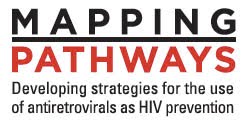2014 TOOLKIT
Mapping Pathways Toolkit - Scenario Planning Exercises to Support Consideration of ARV-based HIV Prevention Strategies
Published December 1, 2014

Click here to access the Toolkit.
A living document, the Toolkit is designed for HIV community planners in the United States. The first draft of the toolkit was utilized with participants of the Mapping Pathways Train-the-Trainer Workshop held in Chicago, 11th-12th November 2014. Feedback from the 26 workshop participants, who represented the 13 cities hardest hit by the HIV epidemic in the United States is incorporated into the current version of this document. The Toolkit provides a set of scenario planning exercises to help community stakeholders carefully consider the implementation ARV-based prevention strategies in their local contexts.
2014 REPORT
Community-driven strategies for the use of antiretrovirals as prevention: United States Workshop Report
Published April 1, 2014

Click here for the open access report.
Click here for background on the report.
2013 REPORT
Developing evidence-based, people-centred strategies for the use of antiretrovirals as prevention
Published June 19, 2013

Download and read the full report, with foreword by Archbishop Desmond Tutu (free, open access.)
Read the report's June 19, 2013 press release
Watch a short interview with the report's lead author, Dr. Molly Morgan Jones, research leader at RAND Europe.
Read the report's concise Research Brief.
2013 PODCASTS
These short podcasts were produced by AIDS Foundation of Chicago (AFC) and feature AFC staffers Jessica Terlikowski and Jim Pickett - both of whom work on the Mapping Pathways project - discussing various aspects of the report and ARV-based prevention strategies.
Listen to a podcast with Jessica and Jim talking about key take-aways (such as the critical need for more emphasis on behavioral and implementation science) from the first Mapping Pathways "Knowledge Exchange Workshop" held in San Francisco. Posted July 30, 2013.
Listen to a podcast with Jessica and Jim discussing PEP, posted July 11, 2013.
Listen to a short podcast with Jessica and Jim talking about PrEP, posted July 1, 2013.
Listen to a short podcast introducing the report with Jessica and Jim, posted June 21, 2013.
2013 KNOWLEDGE EXCHANGE WORKSHOPS
- San Francisco, July 16-17, 2013 - presentation slides
- Atlanta, October 2 - 3, 2013 - presentation slides
- Washington, DC, October 8 - 9, 2013 - presentation slides
2011 - 2014 POSTERS/PRESENTATIONS
- Click here for "Community-driven Strategies for the Use of ARV-based Prevention: Outcomes from U.S. City Workshops," a poster presented at the HIV R4P conference, October 30, 2014.
- Click here for the two AIDS 2012 poster presentations "Developing the evidence base for biomedical prevention strategies" and "Synthesising the empirical evidence to map pathways for HIV prevention planning." Both were presented on Monday, July 23, 2012.
- Click here for the AIDS 2012 slide presentation "Exploring Strategies and Perspectives to Map Pathways for the Use of ARVs as Prevention" - presented on Sunday, July 22, 2012.
- Click here for slides from the June 19, 2012 webinar with AIDS United and AIDS Foundation of Chicago called "Community Perspectives on PrEP"
- Click here for the presentation Mapping Pathways did at the IAPAC Summit on TasP and PrEP in London, England June 12, 2012 (these slides focus on PrEP community perspectives)
- Click here for the presentation Mapping Pathways did at Microbicides 2012 in Sydney, Australia in April 2012 (called "Expanding the Evidence Base for ARV Prevention Strategies: Community Perspectives from India, South Africa, and the United States.")
- Click this blog post to see the two posters Mapping Pathways presented at the ICASA conference in Addis Ababa in December 2011. (One is called "An adaptive approach to ARV-based prevention policy" and the other is "Understanding the evidence for ARV-based prevention.")
MAPPING PATHWAYS BACKGROUND
There is a clear and pressing need to engage policymakers and community stakeholders in the consideration of treatment and prevention options for HIV/AIDS. This necessity has grown stronger in light of current research showing extraordinary promise of using antiretroviral (ARV) therapies for the prevention of HIV. These ARV-based strategies include a ‘treatment as prevention’ model known as TLC+ (testing, linkage to care, plus treatment) as well as vaginal and rectal microbicides and pre-exposure prophylaxis (PrEP).
Mapping Pathways includes a thorough review of the social, economic and clinical impacts of treatment as prevention and TLC+, as well as microbicides, PrEP, and post-exposure prophylaxis, in the contexts of South Africa, India and the United States. Participation and engagement is at the heart of the study, and stakeholder input across the community, research, policy and governmental spheres is a core focus in all three countries.
The project’s aim is to provide the research, analysis and toolks that communities and policymakers need in order to formulate coherent, evidence-based decisions for HIV/AIDS treatment and prevention strategies in the 21st century. Mapping Pathways firmly believes that the evidence base is comprised of more than scientific data derived from clinical research – that it is more than p-values and confidence intervals. The perspectives, experiences, and collective wisdom of community members and key stakeholders must be valued as much as statistically significant trial results.
Community partners have included NAZ India, Desmond Tutu HIV Foundation, AIDS United and AIDS Foundation of Chicago. RAND Europe led the project's research activities.
Funding for the first year (Phase I - 2011) of Mapping Pathways was provided by Merck & Co. All partners.
Phase II funding (2012) was provided by the United States National Institutes of Health and Merck & Co, and included a number of information dissemination activities. All partners.
Phase III funding (2013) was provided by The Gilead Foundation and involved three 2-day Knowledge Exchange Workshops - one each in San Francisco, Atlanta, and Washington, DC. AFC and RAND Europe.
Phase IV funding (2014) was provided by The Gilead Foundation and involved a two-day train-the-trainer workshop and the development of the Mapping Pathways Toolkit: Scenario Planning Exercises to Support Consideration of ARV-based HIV Prevention Strategies. AFC and RAND Europe.
